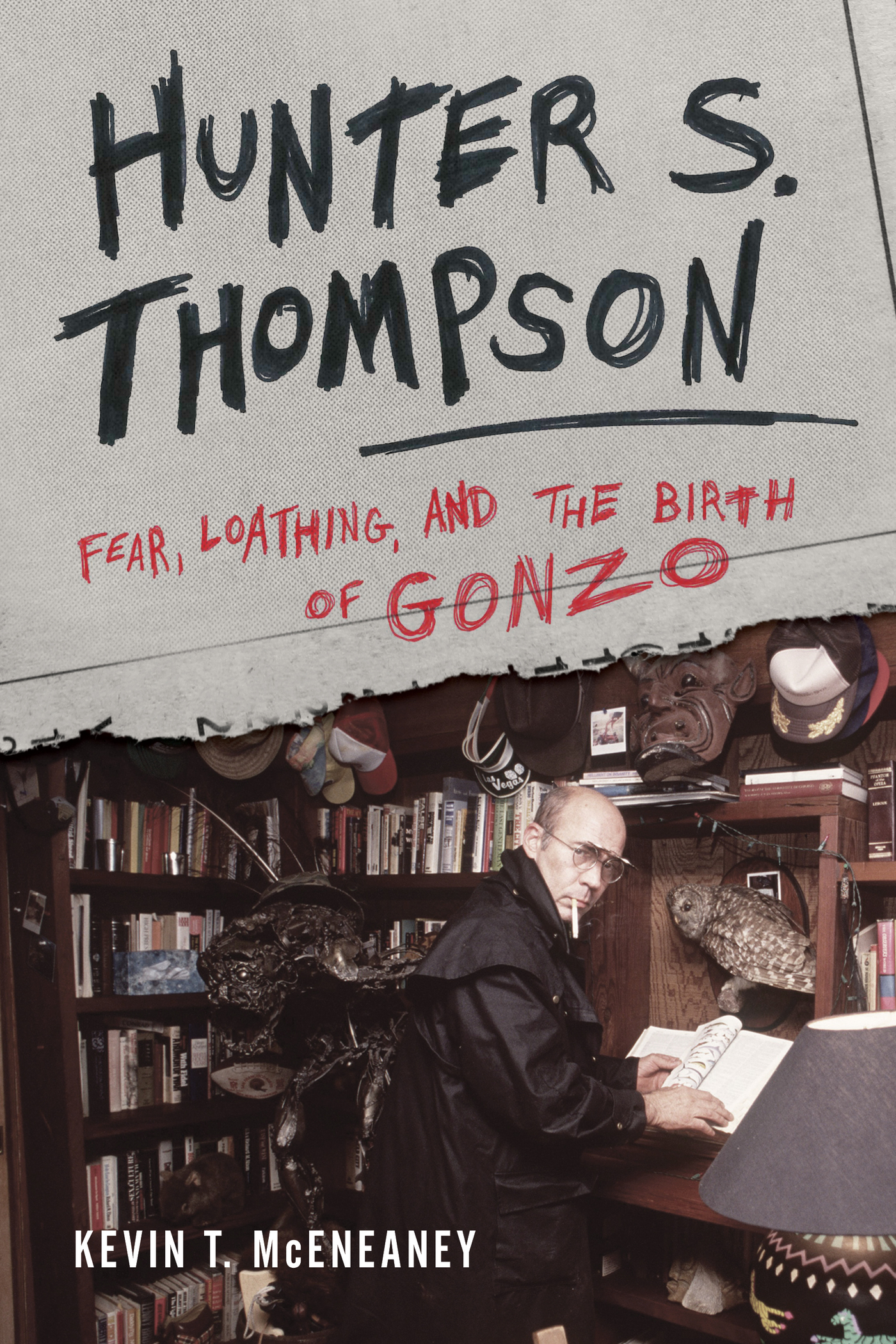Hunter S. Thompson
Hunter S. Thompson
Fear, Loathing, and the Birth of Gonzo
Kevin T. McEneaney
ROWMAN & LITTLEFIELD
Lanham Boulder New York London
Published by Rowman & Littlefield
A wholly owned subsidiary of The Rowman & Littlefield Publishing Group, Inc.
4501 Forbes Boulevard, Suite 200, Lanham, Maryland 20706
www.rowman.com
Unit A, Whitacre Mews, 26-34 Stannary Street, London SE11 4AB
Copyright 2016 by Rowman & Littlefield
All rights reserved. No part of this book may be reproduced in any form or by any electronic or mechanical means, including information storage and retrieval systems, without written permission from the publisher, except by a reviewer who may quote passages in a review.
British Library Cataloguing in Publication Information Available
Library of Congress Cataloging-in-Publication Data
Names: McEneaney, Kevin T., author.
Title: Hunter S. Thompson : fear, loathing, and the birth of Gonzo / Kevin T. McEneaney.
Description: Lanham, Maryland : Rowman & Littlefield, 2016. | Includes bibliographical references and index.
Identifiers: Identifiers: LCCN 2015044459 (print) | LCCN 2015045691 (ebook) | ISBN 9781442266209 (hardback : alk. paper) | ISBN 9781442266216 (electronic)
Subjects: LCSH: Thompson, Hunter S.Criticism and interpretation. | Thompson, Hunter S.Influence. | Thompson, Hunter S. Fear and loathing in Las Vegas. | American literature20th centuryHistory and criticism. | Reportage literature, AmericanHistory and criticism.
Classification: LCC PS3570.H62 Z75 2016 (print) | LCC PS3570.H62 (ebook) | DDC 813/.54dc23
 TM The paper used in this publication meets the minimum requirements of American National Standard for Information Sciences Permanence of Paper for Printed Library Materials, ANSI/NISO Z39.48-1992.
TM The paper used in this publication meets the minimum requirements of American National Standard for Information Sciences Permanence of Paper for Printed Library Materials, ANSI/NISO Z39.48-1992.
Printed in the United States of America
To historian Douglas Brinkley,
who dubbed me Mr. Angles
And perspective it is the best painters art.
William Shakespeare, Sonnet 24
Preface
To you only do I tell the enigma that I sawthe vision of the lonesomest one.Friederich Nietzsche
This book provides a study of literary themes in the work of Hunter S. Thompson. Thompson is known primarily as a political writer and social commentator. As a populist writer, he was also a serious intellectual with deep literary roots. Investigation of those roots reveal Thompsons unique manner of absorbing and transforming varied influences. Many of those influences became a starburst of activity in the creation of Fear and Loathing in Las Vegas, a book that since its 1971 publication has sold at least 60,000 to 70,000 copies a year, a novel that has continued to appeal to each new generation of readers. Half of this study will be devoted to that book because I hope to deepen the subtlety of its appreciation among general readers, and even the academic community, which has been somewhat reluctant to embraces Thompsons vibrant and raucous humor.
Thompsons work offers a parallel to Francois Rabelais, the creator of the Renaissance movement, who sought to revitalize Christianity through humor and political satire. Thompson sought to revitalize the spirit of Americas Founding Fathers through a backwoods pessimistic humor that centered upon failure and disappointment rather than the braggadocio boast of achievement. Like Rabelais, Thompson perceived humor as a revitalizing force in life. And as with Rabelais, below the candied surface of humor resided the nut of wisdom. Thompsons principal theme was the American Dream of freedom and its vital spirit, which he saw as on the decline in the populace at large and in our national and local laws. His view was that of an outsider looking into the glittery shop window of luxury but with an empty pocket, belly full of hunger, and tongue wittily wagging. Thompson was Americas greatest literary and political humorist of the second half of the twentieth century.
Humors central characteristic remains courage to confront the unpredictable. A nations psychological health may be measured by its ability to laugh at itself. If there comes a time when a person or nation loses its sense of humor, then that nation (or person) is in considerable trouble. I hope that the example of Thompsons laughter, and its robust intellectual health, may serve as inspiration for future lovers of this country in times of stress and turmoil.
Much of the book discusses how Thompson employed literary templates: he twisted or warped them in unusual ways to create original commentary. The deeper layer of how these bent literary templates functioned would not be available to the average reader; it has also led to the peculiar situation of a major writer not being taken too seriously by the literary establishment because of his complex sense of humor. In this process I have relied on his letters, as well as literary allusions, in an attempt to see what is written from the authors point of view. The books title uses the word enigma, indicating something difficult to explain. While there usually isnt anything funny in explaining jokes, much of Thompsons work cries out for exegesis. A comedian requires a plausible aura of mystery to protect the legerdemain of the work and administer variations on it. I hope I have explained the enigmatic difficulties of Thompsons work without damaging it, leaving his legacy as an example of resonant literature that should influence other writers.
Acknowledgments
I wish in particular to thank historian Douglas Brinkleys extraordinary wisdom, empathetic understanding, and dedication during his Hunter S. Thompson seminar at the Norman Mailer Writers Colony at Provincetown. His fierce intellectual depth stimulated me to finish this work much quicker than it would have otherwise proceeded. At Norman Mailers house, cheerful Jessica Zlotnicki and witty Guy Wolf created an invisible and seemingly effortless aura of hospitality and efficiency. The presence of Normans benevolent ghost lurking amid bookshelves must have transmitted to me some of his inspiration and industry. I thank seminar participants, possessed during the sance, whose lively observations, offhand remarks, and stimulating ideas may have contributed to my thinking. Those august personnel consisted of journalists Michael Keane, James Kirchick, Mathew Mercier, Dan OSullivan, and Bill Shea; fiction writers Jo Lennan and Liz Moore.
My gratitude extends to several people who read in part or whole my rough draft and offered helpful comments: Ed McNicoll in the early and rougher going, Gerald Williams as chapters neared completion yet were not complete; the Reverend Douglas Grandgeorge and Martha Moffett for special comments; Liz McNicoll and Veronica Towers for cogently perusing other parts of the manuscript. Above all, the inspiration of Douglas Brinkley looms. Any shortcomings sit squarely on my shoulder, like a terrified cat sinking its claws into sunburned skin. For my Renaissance education, I thank A. Bartlett Giamatti, James Mirollo, and Joseph Mazzeo, the latter two of Columbia University.
Slowly
Uncloud the borealis of your eye
And show your iceberg secrets, your midnight prizes
To the green-eyed world and to me.
George Barker, Turn on Your Side and Bear the Day to Me
Chapter 1
Louisville Slugger
From Delinquent to Celebrity
Until I myself read and then met Hunter, I would have thought it impossible for anyone whose brains were so saturated with mind-benders to make sense on a telephone, let alone write so well.
Next page
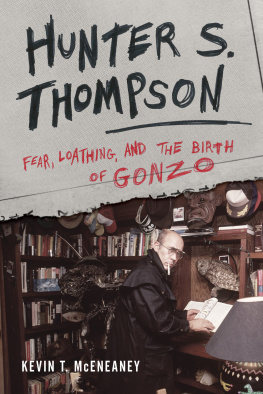
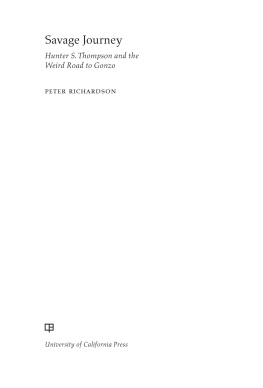


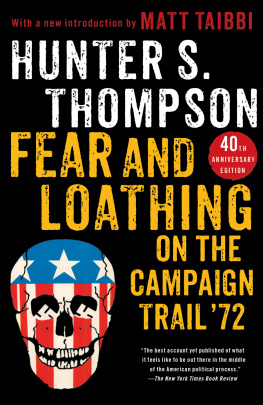
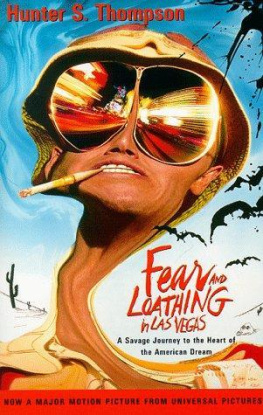
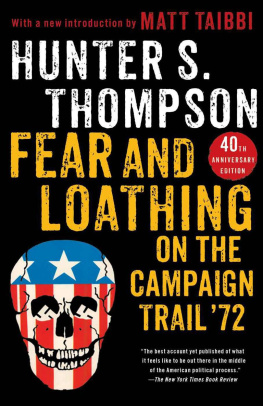
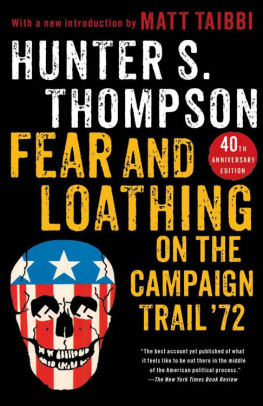

 TM The paper used in this publication meets the minimum requirements of American National Standard for Information Sciences Permanence of Paper for Printed Library Materials, ANSI/NISO Z39.48-1992.
TM The paper used in this publication meets the minimum requirements of American National Standard for Information Sciences Permanence of Paper for Printed Library Materials, ANSI/NISO Z39.48-1992.